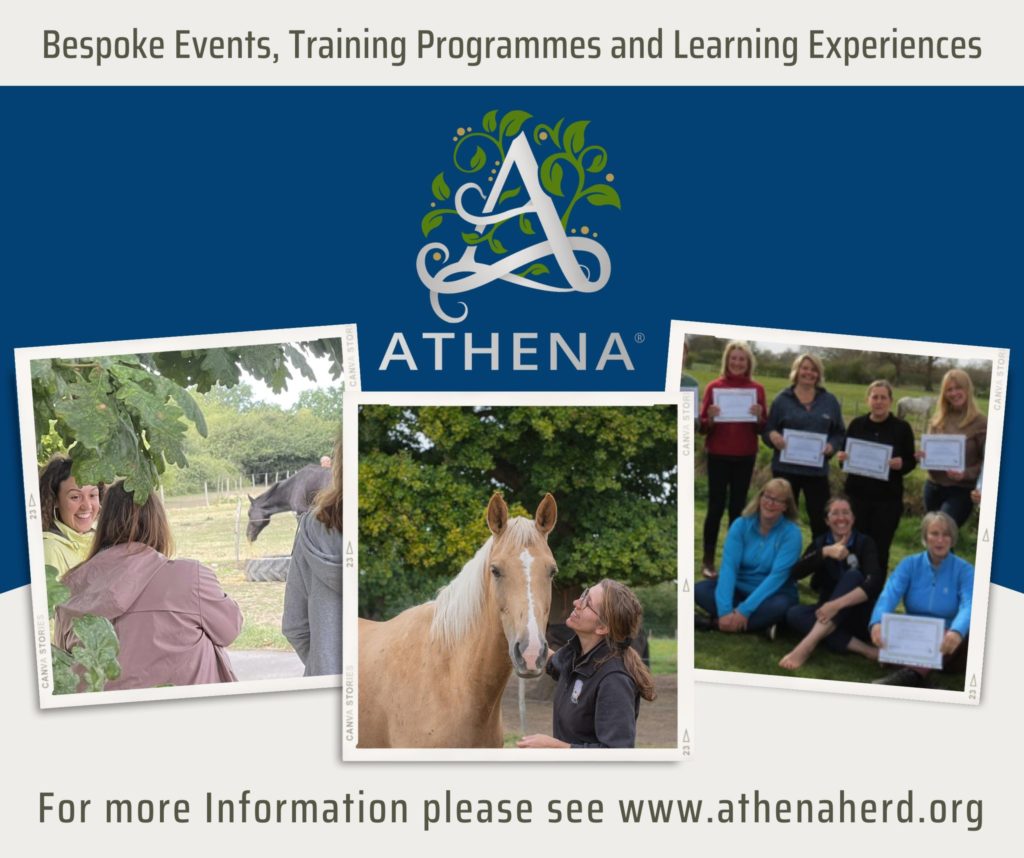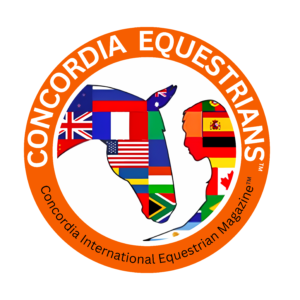EQUINE FACILITATED INTERACTIONS
LOOKING FOR A WIN – WIN – WIN SITUATION!
Jennifer Geach of the Athena Herd Foundation* answers our questions about Equine Facilitated Interactions, talking us through the different aspects and how it can and should be – a positive experience for the horse, the client and the facilitator!
This article is also published in Issue 8 of CONCORDIA INTERNATIONAL EQUESTRIAN MAGAZINE
What are “Equine Facilitated Interactions”?
“Equine Facilitated Interactions” is an umbrella term used by the Athena Herd Foundation to define how one can take their whole self into a session being held by an individual who is either facilitating or assisting the interaction for them in the presence of an equine (horse, horses, donkey or donkeys). These sessions are facilitated with the intention of creating an enhanced degree of self-awareness and personal insight for the client, that can be safely explored within the individual facilitating or assisting the interaction’s scope of practice (see below) and reshaped to create an experienced difference that can be crystallised into transferable take-away learning for them.
Equine Facilitated and/or Assisted Learning, Equine Facilitated and/or Assisted Therapy/Psychotherapy
Depending on the scope of practice and qualifications of the individual facilitating or assisting the interaction, terms used in this field are often Equine Facilitated and/or Assisted Learning and/or Equine Facilitated and/or Assisted Therapy/Psychotherapy.
It is essential to clearly define one’s scope of practice in this space and stay within the bounds of one’s scope of practice.
- Learning approaches tend to be focused and set in the present time, with the facilitator looking to support future change/learning for the client. Having said this, a client may bring up a challenge(s) relating to mental health, in these circumstances it is important that a facilitator can signpost a client to the appropriate professional for diagnosis and treatment (see Therapy/Psychotherapy below). We do feel that first aid courses for mental health such as the one offered by Mental Health First Aid England (also hosted by the Athena Herd Foundation) can provide additional beneficial sign-posting support in this space.
- Therapy/Psychotherapy approaches can differ, they may look to further explore emotions and the past to understand the present and develop skills for managing emotions or past issues.
Why Equines?
By their nature, horses are situationally and socially present, and to work effectively with them humans need to be the same, and so must develop and engage these qualities. As a herd-based flight animal, horses are sensitive to their environment and consciously aware of the energy, emotions and intentions of those around them. They are adept readers of non-verbal communication to which their reactions and responses are honest and unconditional. As a result, they respond to people as they are, and if people change, they will change with them, providing the feedback that is essential for human learning.
Are the Equines ridden?
The interactions can either be ground-based or ridden. The Athena Herd Foundation focuses on ground-based interactions, however, therapeutic ridden work is covered in its training programmes and qualifications. This ridden work is often more commonly referred to as hippotherapy.
Who typically trains with the Athena Herd Foundation?
Really great question. The short answer is anyone who would like to incorporate horses into their practice. In no particular order, the Athena Herd Foundation has, for example, trained national and international Riding for the Disabled (RDA) centres looking to incorporate ground-based approaches into their work, riding instructors, coaches, owners of animal-assisted therapy centres along with those having independent school status, Occupational Therapists, Social Workers, Counsellors, Psychotherapists, Teachers, Mental-Health Nurses as well as individuals that have trained in other approaches or those who are just curious.
Our experience is that people come to us either because of their own personal learning and development journey or because our training programmes are formally recognised and externally accredited, as well as because the horse-centric ethos of the Athena Herd Foundation resonates with them.
What is the approach?
The Athena Herd Foundation doesn’t consider that there is one standard approach to this work. Our approach is client-led/focused and has the equine at its heart. We recognise and respect that it can take a lot for a client to come along to a session.
An interaction can be as simple as quietly observing an equine from a distance or interacting with an equine in their environment, or working in a more structured way in a field, arena or sand school, depending on the facilities available.
In changing how we are, we can not only change our own experience but the experience of others around us. In interactions with equines, it isn’t about what we say or how we say we feel. For us at the Athena Herd Foundation, it is about the client and how the facilitator holds a safe space and frames the session for both the client and the equine.
Athena Herd Foundation focuses on creating positive transferable experiences for learners and clients.
What is in it for the Equine?
Another really great question. We can only really speak for the horses living in a mixed herd on a barefoot track system at the Athena Herd Foundation, living as naturally as possible with freedom of choice. The equines’ welfare is at the heart of everything we do at the Athena Herd Foundation, this comes before anything else. The wellbeing of the herd and ensuring their needs/resources are met in our view is paramount to creating a safe space for horses and, as a result, for humans. We look to create positive interactions for the equines with people.
Whilst the track system works well for the horses at the Athena Herd Foundation, it is acknowledged that it doesn’t necessarily work for all horses and humans which is why we advocate an approach based on the ‘Five Domains’ (positive approach to animal welfare developed by Professor David Mellor).
How does one get into this as a profession?
Our experience to date has been that personal journeys can play a huge part in an individual’s decision to pursue a career in the Equine Facilitated Interactions space. Other examples have been business-related decisions to further expand current offerings from room-based activities/therapies to outdoor interactions. Riding centres that have traditionally only offered ridden work have been looking to expand their offering to a broader client base by being able to also offer ground-based approaches.
How does one find a suitable course?
- Do your research.
- Consider what you are looking to achieve/what approach feels right for you. We recommend asking a series of questions to help shape that decision, which can include:
- What level of financial investment is needed?
- What are the real costs i.e. is there a one-off cost to train and attain a recognised qualification or are you required to pay ongoing licence fees;
- What feels like the appropriate level of qualification to meet your future aspirations;
- Are you looking to incorporate equines into an existing area of practice? If so, what skills do you need to complement this?
- Which courses are recognised for insurance purposes?
- What is the ethos of the training provider particularly around the equines?
- Is the course externally accredited/certified? Does it offer continuing professional education credits?
- Is there an authentic community spirit/ongoing support?
- Is there any business support from an appropriately experienced/qualified individual?
- What do you know about the individual trainers and their experience and/or the organisation (fully insured for training/running sessions, accounts in order/reputable, has appropriate terms, policies and procedures in place, who are you contracting with, invoiced appropriately from a company account, externally accredited?);
Lastly, think about whether you would like to join a Register that is accredited, including, for example in the UK, an accredited Register regulated by the Professional Standards Authority (requires a minimum of a Level 4 qualification). Is the qualification recognised?
How does the client know that the horses’ needs are catered for?
Again, research is key. Other things to think about would be, for example, but not limited to:
- What sort of a feel do you get from the organisation? (Are the equines relaxed in their environment, do they seem/look fit and well, are you aligned?)
- Are the equines well cared for (considering the ‘Five Domains’ Model)?
- Does the organisation have policies and procedures in place around the animals and animal welfare? Do they walk the talk?
- Do the animals get to choose whether or not they would like to be part of the interaction? Has any equine’s trauma/challenges or even his age been considered in terms of whether said equine should/should not be working in this space?
- Are the equines working in multiple disciplines/how often are they being asked to work?
*Athena Herd Foundation CIC is an Awarding and Learning Community.
The Learning arm of the Athena Herd Foundation is a specialist leading national and international training provider of Equine Facilitated Interactions.
Jennifer Geach is the co-founder of the Athena Herd Foundation, and the Athena Herd Foundation is Concordia Magazine’s mothership! The Learning arm of the Athena Herd Foundation is a leading specialist in this field and a national and international training provider of Equine Facilitated Interactions. The Interview was edited for clarity.
This article is also published in Issue 8 of CONCORDIA INTERNATIONAL EQUESTRIAN MAGAZINE

